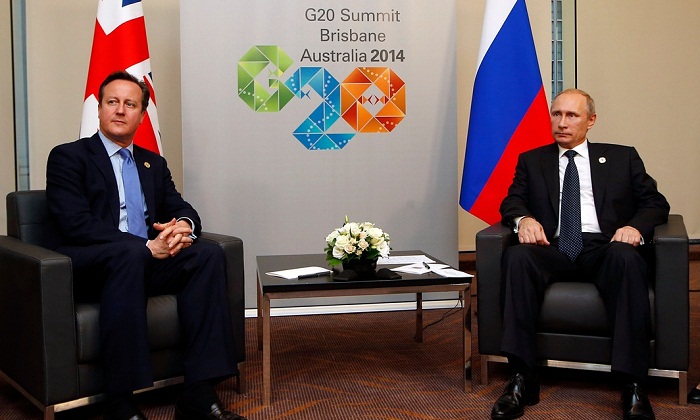David Cameron to try to sway Putin over Syria bombing at G20 summit

The meeting on Monday will be the first time the two leaders have met directlysince the last G20 summit in Brisbane, where they discussed the need for Putin to pull back in Ukraine.
The linked crises of Syria and refugees are likely to to dominate the summit, with Turkey a key player in the conflict and the country that has acted as the single largest conduit for refugees fleeing to Europe from Syria, Iraq and Afghanistan.
Cameron has spoken to Putin twice on the phone in recent days, first to express his condolences at the downing of a Russian plane flying over Sinai, and then to pass on British intelligence suggesting that the jet had been bombed.
The prime minister, along with other western leaders, was taken aback by Putin’s launch of a bombing campaign in Syria designed to prop up the country’s president, Bashar al-Assad, that hastargeted moderate opposition groups in addition to Islamic State. Cameron will attempt at the summit to persuade the Russian president that Assad is a barrier to long-term peace in Syria.
Russia and the US have launched parallel peace plans for Syria, leading to progress on some issues, such as territorial integrity, but leaving unresolved the issue of whether Assad should be allowed to remain in power after a transition and independently overseen elections.
Regional players including the US, Russia, Iran, EU countries, Saudi Arabia andTurkey are due to discuss the peace process in a second round of talks in Vienna on Saturday.
British officials said of the two sides’ positions: “There are differing views on whether Assad definitely goes, and when does he go. There is a lot to do to bring the differing sides together.”
The capture by Kurdish forces of the key strategic town of Sinjar from Isis, which links the group’s territories in Syria and Iraq, does not necessarily impinge on the likelihood of Assad staying.
John Kerry, the US secretary of state, said on Thursday: “Asking the opposition to trust Assad or to accept Assad’s leadership is simply not a reasonable request, and it is literally, therefore, a non-starter.
“And even if we wanted to, even if you made the worst deal with the devil, and said, ‘well, that’s what you have to do to try to make this process go forward’, I got news for you, it will not stop. Because there are those invested in what has happened and in what has been done to them, who see Assad as the critical component of the transition. That’s why we are pushing so hard for a real transition.”
At the very least, Cameron will press Putin to agree not to attack the groups seen as legitimate components of a democratic transition in Syria. The Vienna talks are partly designed to agree a list of organisations that could be included in a transition process, and those that should be designed as terrorists.
British officials implied that some of the Russian airstrikes appeared to be aimed at harming groups that have a legitimate role in Syria’s transition. “We need to really understand the Russian position, what [are] their objectives, who they are supporting, who they are willing to have around a table and who they are willing to have a part in a political process,” they said.
Russia insists it has hit targets identified by the Free Syrian Army, disproving claims that it has been bombing the moderate opposition.
Britain is likely to side with the recently re-elected Turkish president, Recep Tayyip Erdoğan, with regard to his concerns over the behaviour of Kurdish forces in the region. On Friday, the UK defence secretary, Michael Fallon, criticised the Kurdish Democratic Union party (PYD) – a Western ally in Syria – over reports of forced expulsions of indigenous local groups, including Arabs and Turkmen, after it captured new territories from Isis in northern Syria.
Cameron is also likely to raise the issue of doping in Russian athletics and whether any medals secured by Russian athletes at the 2012 London Olympics should be rescinded.
Erdoğan is to lead a discussion on Syria and migration at a dinner, and is looking for assurances that Turkey will receive more cash to cope with the continuing arrival of refugees.
The question of whether more can be done to provide jobs for Syrians permanently displaced in Lebanon, Jordan and Turkey, including employment and education in refugee camps, may be brought up by Cameron.
Climate change, reflating the global economy and development goals are also on the agenda in Turkey.















































